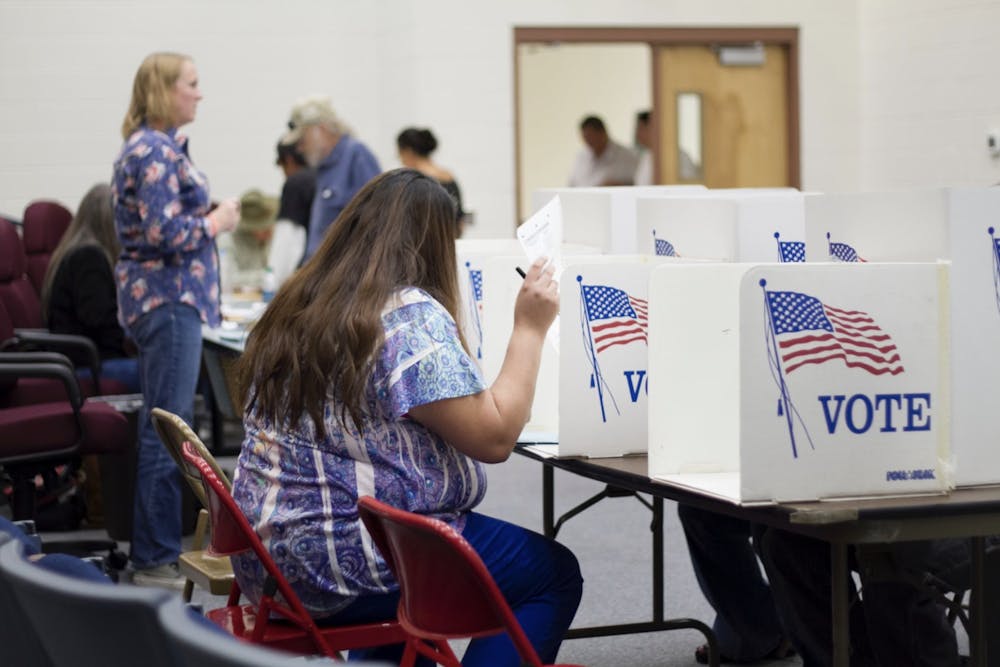By Chiara Piacentini
Staff Writer
As Election Day is fast approaching, voter turnout will play a major role in the results of the 2024 election. But not everyone is on board with going to the polls.
“The divisive climate in these last few elections have really turned people away,” said TCNJ Votes! Fellow Andrew Lomonte, part of the student-run organization that encourages students to vote by informing them about the voting process.
According to an NPR poll, 23% of respondents said they weren’t interested in politics and nearly 30% said they didn’t vote in the 2020 election because they weren’t registered.
These numbers have appeared to grow, according to the U.S. Census Bureau’s most recent data on voter registration, which shows that in 2022, only around 48% of Americans were registered to vote, an estimated 2% decrease from 2020’s voter registration numbers.
Political polarization could be playing a role in the declining voter registration turnout. Cadence Willse, an assistant political science professor at the College, said voters could be turned off from voting in the election due to “misinformation about the validity of elections, the partisan bickering and extremism within the party.”
Since the 2016 election, concerns about misinformation started to gain more attention and have continued to become a more prevalent issue since then, according to data from the National Library of Medicine.
After former President Donald Trump claimed that there was widespread voter fraud in the 2020 election, 36% of Americans believed President Joe Biden was illegitimately elected, according to a December 2023 survey by the Washington Post and University of Maryland.
“Any sort of rhetoric that undermines the institution of voting is going to make it less likely for folks to vote,” Willse said.
In terms of partisan rhetoric, the two parties have become more polarized since the mid-1990s about political values, according to the Pew Research Center. The pandemic and the outcome of the 2020 election has only exacerbated the divide.
“I would love to make politics boring again and have people disinterested in politics because they don’t need to be interested in politics,” said Daniel Bowen, an associate political science professor. “Not everyone needs to be interested in politics. I think it’s totally fine to have boring every-day politics where there are very low barriers for people to get involved and interested and let people choose.”
However, disinterest in politics isn’t the only factor turning people away from the ballot box. Voters’ busy schedules also play a part in their failure to turn up at the polls, according to The Washington Post.
Bowen said that since most people have busy lives, “registering to vote may not be on their agenda.”
While New Jersey has made voter registration more convenient, with an option that doesn’t require driver or non-driver identification, voters had until Oct. 15 to register this year. Most states require voters to register weeks in advance of Election Day.
“Every state in the country could have Election Day registration if they wanted to,” Bowen said. “But it’s a hassle and it means that people who are less engaged have a greater chance of voting and not every state wants that.”
Conservative-leaning states tend to have stricter voter ID laws compared to progressive states, according to USA Today. Some have adopted new voting restrictions, propelled by Trump’s claims of voter fraud in the 2020 election.
“My first hope is that we can get rid of these laws or that we can give everyone universal IDs,” Willse said.
Minnesota, which has a history of making the voting process convenient, can provide some insight into how the voter turnout rate would result if this logic is applied. In fact, The North Star State had the highest voter turnout in the 2020 election, beating out the national average by about 12 percentage points, according to The Hill.
Trading opinions on election issues that matter to voters may also be a way forward to encourage more voters to the polls, according to Bowen.
“On the individual level, we can help inform the people in our lives,” Bowen said. “We can talk to our neighbors, we can talk to our family members and our friends. We can say, ‘Hey, this is really important to me. Let me tell you about what I think.’ That’s not a bigger solution, but it could be helpful.”







